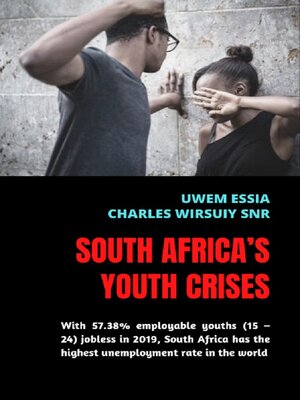SOUTH AFRICA'S YOUTH CRISES
ebook ∣ With 57.38% of employable youths (15 – 24) jobless in 2019, South Africa has the highest unemployment rate in the world
By Uwem Essia

Sign up to save your library
With an OverDrive account, you can save your favorite libraries for at-a-glance information about availability. Find out more about OverDrive accounts.
Find this title in Libby, the library reading app by OverDrive.



Search for a digital library with this title
Title found at these libraries:
| Library Name | Distance |
|---|---|
| Loading... |
South Africa is a young democracy grappling to reconcile its apartheid history with its present reality of majority black rule. Despite the political settlement that enabled the transfer of political power to the ruling African National Congress (ANC), little is done to create melting pot mechanisms to connect the fast-growing hi-tech sectors with the primary and secondary sectors of the economy. As this is happening, there is an obsession in the black political discourse about the pro-Marxian notion of "monopoly capital", with arguments supporting the expropriation of lands owned by the whites. All such divisive discussions hurt the South African economy more, by driving a wedge between the whites and blacks, discouraging the inflow of foreign investment, promoting capital flight, and widening the income gaps further. South Africans have to coexist peacefully with each other and ignore racial, gender, class, and economic backgrounds. The pedestal on which apartheid was fought and dismantled was reconciliation. Hence arguments like expropriating from the whites the land they already had, and sentiments around the so-called monopoly capital are vexatious and undemocratic. All such forms of one-hand clapping that embed petty jealousy and racism must be jettisoned. What is urgently needed is for the state to nurture and grow an inclusive stakeholder economy at the local, provincial, and national levels, where the government, civil society movements, the private sector, and foreign partners/donors can pull resources into basket funds for dealing effectively with youth employability and job creation.
It is also essential the youths particularly, and South Africans generally go through lifelong learning programs for democracy education and for entrepreneurship. Guiding the youths to become patriotic citizens of a modern pluralistic state like South Africa is as necessary as empowering them with employable competencies. Civic education is necessary for young democracies and should be taught in schools, places of worship, homes, and communities, using all media channels. Migration is a key development factor in the new economy, and it is time South Africa and other African countries liberalize their citizenship policies to ease the process that immigrants who have contributed significantly to development or have the potentials to do so, and desire to acquire citizenship, are supported to do so.







